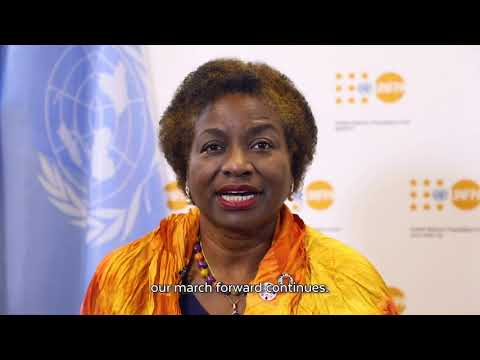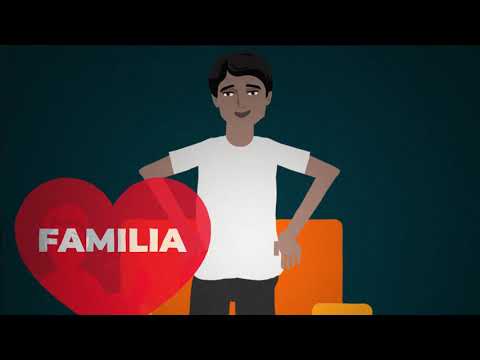Mr. Chair
Deputy Secretary-General
Excellencies
Distinguished delegates
Dear colleagues, dear friends
Education!
It is transformative – for individuals and their societies.
It is the foundation for human capital development, and a powerful driver of economic growth.
Education. It is a predictor of population health and well-being; an important indicator of whether a pregnant woman and her infant will live — or perish.
The ICPD Programme of Action sets out an ambitious, people-centered agenda to achieve inclusive, equitable, sustainable global development and to ensure women’s empowerment and gender equality.
For this, universal access to quality education is essential.
Why?

Imagine a girl standing at a fork in the road. If she is able to stay in school, she’s well set on a path of lifelong health and well-being.
However, when she is forced drop out of school, to marry as a child, if she becomes pregnant while still a child herself, what she faces is a cascade of challenges over the course of her life, jeopardizing her health and well-being and that of her children, and ultimately, her society’s prospects for prosperity.
Mr. Chair, Distinguished Commissioners
UNFPA knows this girl. In fact, too many to count. Like Aminata, whose dream was to be a nurse. It ended when she became pregnant at 15. She told us: “Having a child at my age was a big mistake. I don’t work. I am a school dropout. My peers are in school while I am at home nursing a baby.”
Stories like Aminata’s are as common as they are tragic – a girl’s life turned upside down due to ignorance about her body and her rights.
For vulnerable women and girls in particular, education is a door opener and a life changer.
When provided with the knowledge and skills they need to know and claim their rights, better educated women are healthier, marry later and are more likely to plan the number and spacing of children.
They are more likely to use prenatal care, vaccinate their children and to seek health services when they or their children need care.
They are more likely to participate in the formal labour market and earn higher incomes.
Education also reduces the likelihood of harmful practices like child marriage and female genital mutilation and lowers risk of gender-based violence.
Quality education is a fundamental human right, and we must protect and defend it for everyone, including comprehensive sexuality education (CSE), which is offered in an age-appropriate, culturally sensitive manner.
CSE equips young people with the knowledge, skills and attitudes to develop positive, healthy relationships; it helps adolescent girls avoid unplanned pregnancies; and counsels girls and boys to stay in school and make a safe transition into adulthood.
It makes perfect sense: give people the information and power to take charge of their own reproductive rights and choices, and development outcomes improve.
Today, technology and innovation are expanding opportunities and expanding minds. Digital access and skills are becoming imperative for almost everything – from education to livelihoods. New technologies are making lifelong learning accessible and enjoyable for older persons.
Yet the reality is, technology is increasingly misused and weaponized. Let us not allow technology to add another layer of disadvantage and discrimination against women and girls.
Mr. Chair, Distinguished Commissioners
You are the guardians of the ICPD Programme of Action. Therefore, this 56th Commission must play its pivotal role in revitalizing the global commitment to universal education, especially ahead of this year’s SDG Summit and next year’s 30th anniversary of ICPD.
Current shortfalls in education must be rectified, as the Secretary-General’s reports underscore.
Even where school enrolments have expanded, too many children remain shut out, unable to read, write or calculate. Teachers are too few, too overstretched, and undertrained in modern teaching methods.
The fact is women constitute two-thirds of the 770 million adults who can’t read and write. They need deeper, local investments to lift them out of that predicament.
Official development assistance to education must increase, along with greater domestic support for strengthening education systems, complemented by supportive policies, a conducive political, legal and social environment, universal digital access, and the peaceful conditions for learners to thrive.
Development planning depends upon quality disaggregated population data, to ascertain precisely who is being left behind, where and why.
Geo-referenced data from Censuses, in the hands of Parliamentarians, statisticians, technical experts and concerned citizens, can assist Member States with well-designed investment plans; and with the foresight to respond to national and local population trends — and the current and future needs of all school-aged children, including children with disabilities.
Excellencies, esteemed delegates,
The year 2030 draws ever closer. Let us urgently heed the promise of the ICPD agenda.
As ICPD30 approaches next year, with its review of the landmark Cairo consensus, women and girls are depending on you.
Make no mistake: an adolescent girl desperately needs comprehensive education to succeed in her life. The work and outcome of this Commission is immensely important to support her in her educational aspirations — and to nurture her dreams of a better life.



